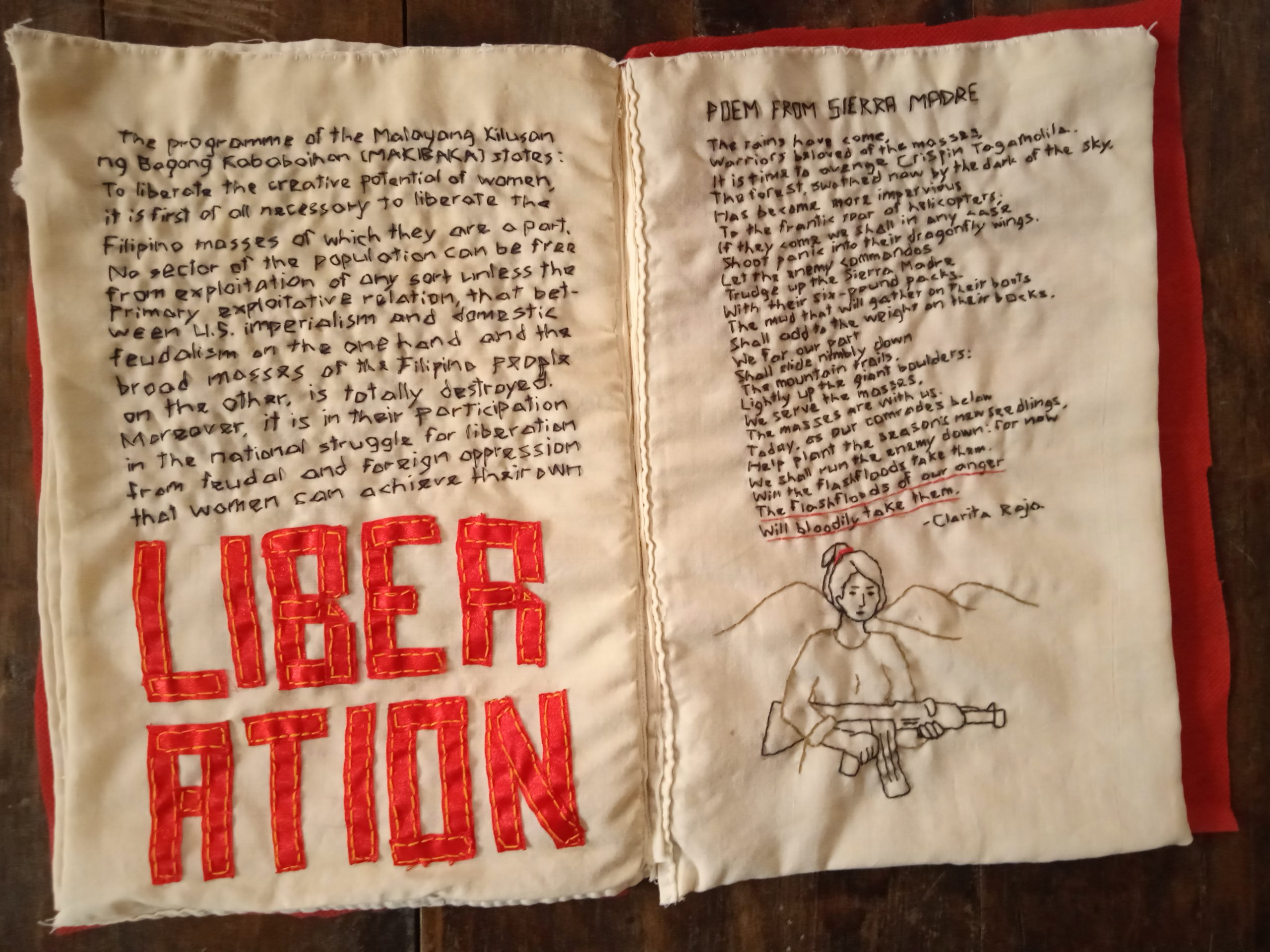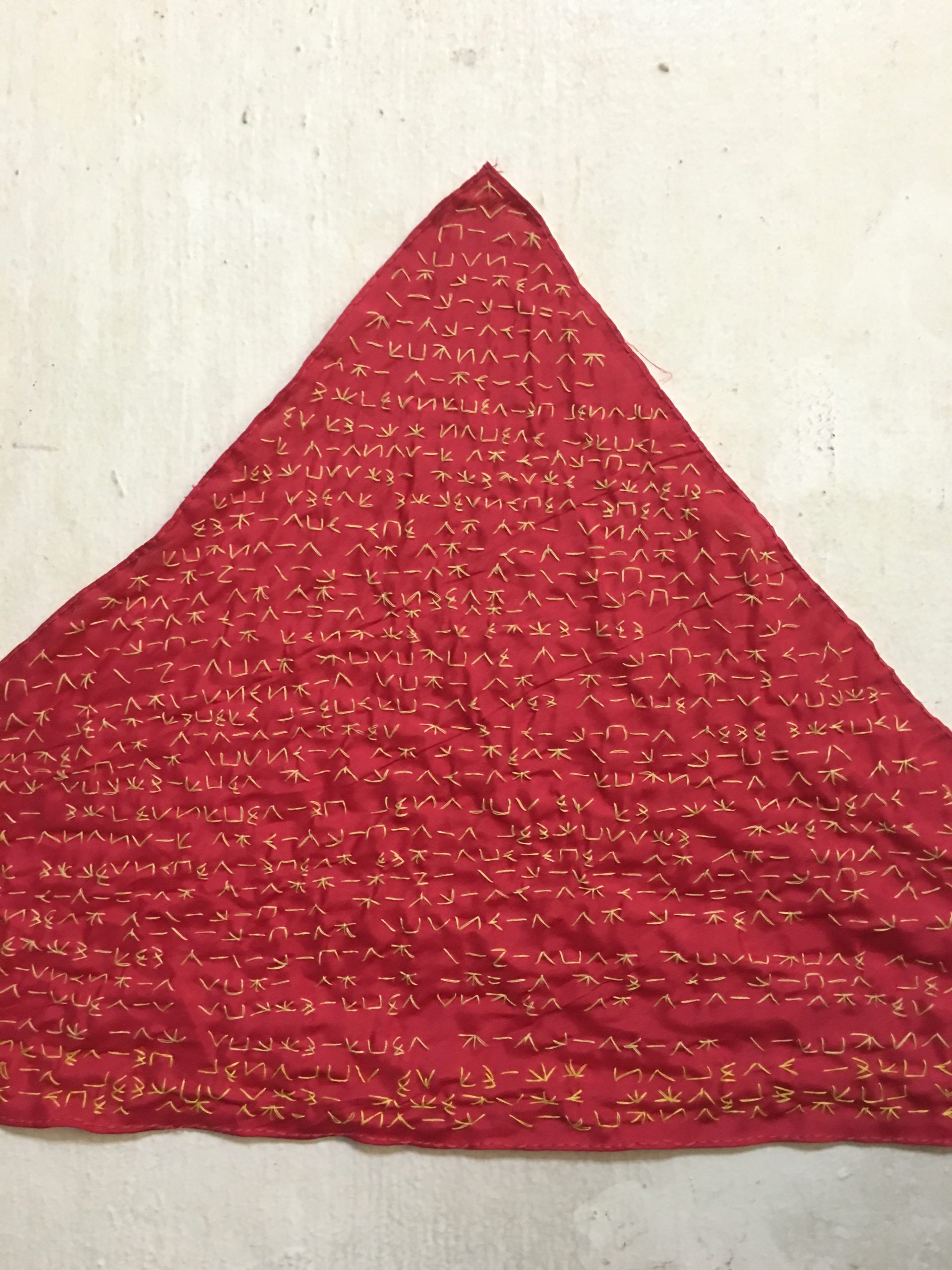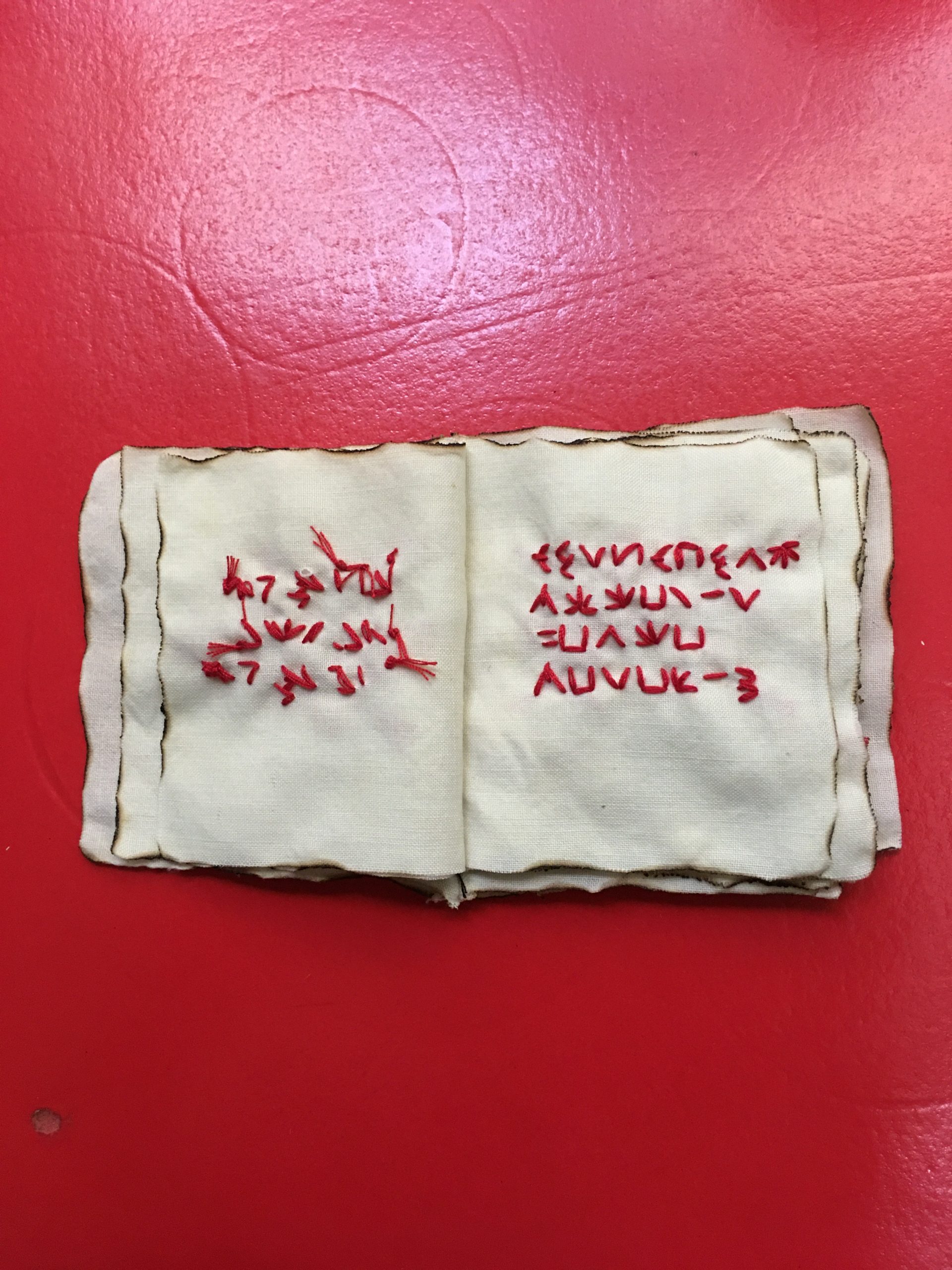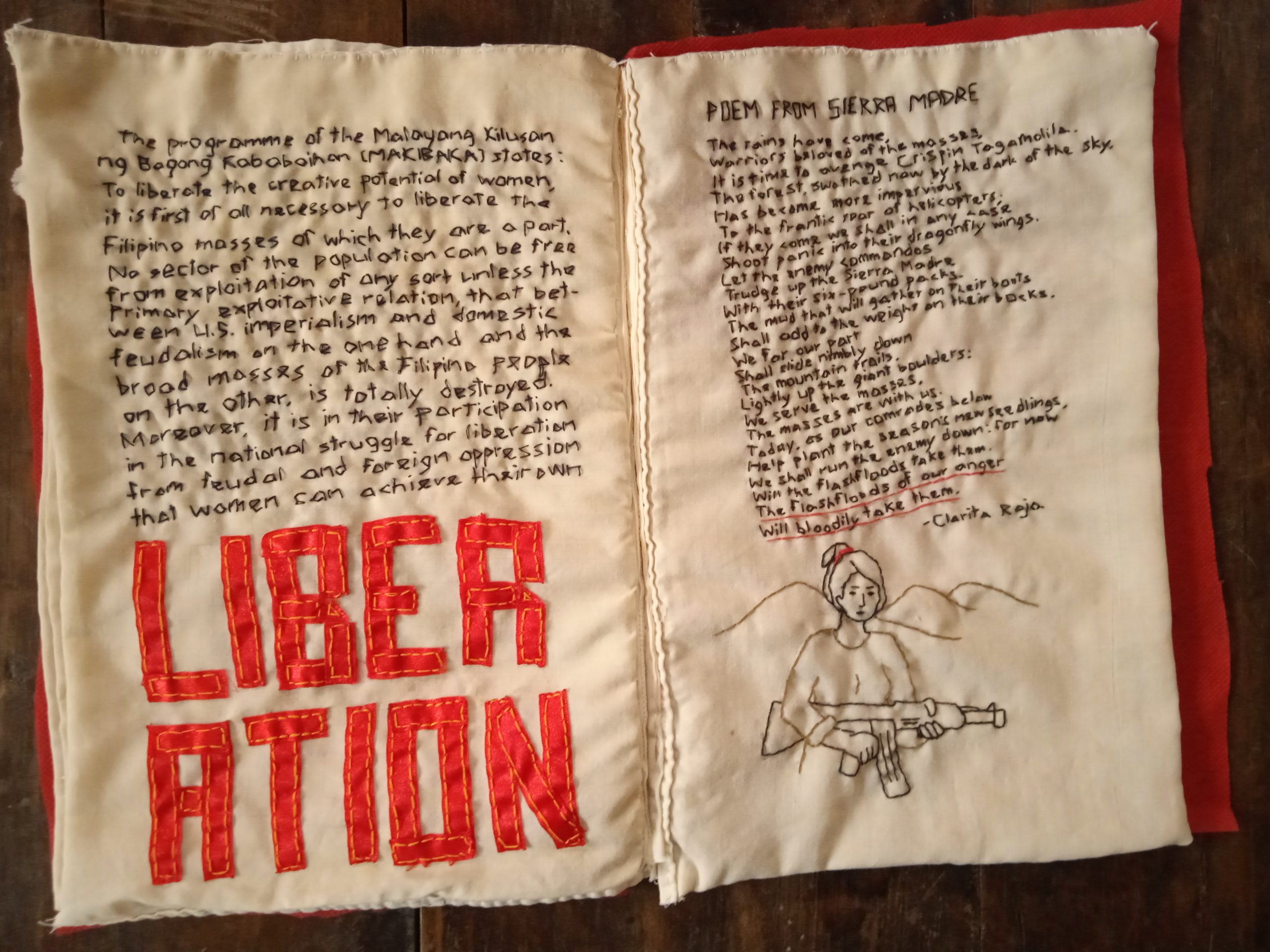
Before community lockdowns were enforced in the Philippines in March 2020, Gantala Press, a feminist small press and literary collective, had plans to participate in an exhibition at the Cultural Center of the Philippines Library that was to publicly launch the Valerio Nofuente Collection. Valerio Nofuente was a professor of Filipino and Philippine Literature at the University of the Philippines who “met with a violent death under mysterious circumstances in 1981 … [and] has been honoured by the Concerned Artists of the Philippines as a martyr for the cause of the nationalist struggle.” The exhibition was to celebrate the removal of the collection from the archive of books banned by the Marcos dictatorship.
In response to the collection, Gantala Press decided to make a cloth book about the Malayang Kilusan ng Bagong Kababaihan or MAKIBAKA, a National Democratic women’s organization formed in the 1970s. The book was to be based on materials in the collection that the press found to be of interest, such as MAKIBAKA’s newsletter, Malayang Pilipina, as well as a chapbook by Clarita Roja-. Of course, “Makibaka” (“Join the Struggle!”) has also been a battle cry of Filipino activists since the 1970s.
The plan was for the members of the collective to individually embroider texts or images from these documents onto cloth pages, which we would then bind into a book. We thought that the book could be passed down to other/younger women, who could then mend and/or add new pages or new elements. The research aspect of the project—finding texts and images to render in embroidery—would reflect the often difficult task of sifting through archives, through history, in search of women’s stories. Meanwhile, the stitchwork would imitate the multiple layers of work that women have to do: keeping things in order, mending broken things, committing things to memory, all often unpaid labor.
The cancellation of the exhibition due to the pandemic temporarily shelved Makibaka, which was to have been the collective’s first cloth book. Eventually, I took it on as a personal project, especially after the curator of the Nofuente exhibition, Alice Sarmiento, proposed that the cloth book be included in an online exhibition.The exhibition was to become Where We Are: When the Storm Comes?, a collaboration with the Saigon-based indie press, Bar de Force. Where We Are “is an attempt at documenting everyday life and feminist responses to being locked down or surveilled, as part of our respective country’s solutions to curb the COVID-19 pandemic. … Gathered here are projects that question and critique the rhetoric of resiliency and the strategies of discipline, silencing, and censorship that pervade the so-called New Normal for both the Philippines and Vietnam.”
By that time in June 2020, in the middle of the longest lockdown in the world, I was deep in thought about bookmaking—its continued relevance, its being “non-essential” in a world that urgently needed food and a vaccine, as well as its materiality. At a time when people, including me, were starting to explore new ways of coping with collective distress and anxiety, on top of my personal obligation to persist in my work as an activist, I thought: why not merge two activities I love and enjoy and sew books?

So I began treating cloth like paper and thread like ink. In June, the Congress and Senate railroaded the Anti-Terrorism Act of 2020 as part of the government’s crackdown against so-called communists. The bill had a loose definition of “terrorism” and imposed impossibly heavy penalties on basically anyone who expressed dissent against the government. This was the context of my cloth zine “Red Bandanna,” in which I embroidered the names of the people’s organizations that were “red-tagged”—identified as dangerous communists, i.e., terrorists—by the National Task Force to End Local Communist Armed Conflict (NTF-ELCAC) onto a red bandanna that I had worn (it was given away by one of the organizations) in a pandemic protest rally I had managed to join as a volunteer of Rural Women Advocates (RUWA). I used an invented code to spell out the organizations’ names and based the code on simple embroidery forms.

I again used the invented code to embroider onto a cloth booklet hashtags that “trended” during the pandemic: Free Mass Testing Now; Ayuda, Ibigay Na (Subsidy, Now!); Aktibista, Hindi Terorista (Activists Not Terrorists); Solusyong Medikal, Hindi Militar (Medical, Not Military, Solutions); Junk Terror Law; and the word Free attached to several groups of wrongfully arrested activists: Leyte 5, Calaca 6, Marikina 10 (the numbers indicate how many activists were arrested while the names refer to where they were arrested); Piston 6, the jeepney drivers who were jailed after picketing for food and the permission to drive their jeepneys and earn their livelihood; and Pride 20, the members of the militant LGBT organization Bahaghari who organized a Pride March in protest of the Anti-Terror Bill. My square cloth booklet was “published” on July 7, also the 128th anniversary of the founding of the Kataas-taasang, Kagalang-galangang Katipunan ng mga Anak ng Bayan, or Katipunan, the Philippine anti-colonial, revolutionary organization. The booklet poses the question: “How would art collectives like Gantala Press, which heavily use social media in their activism, subvert this kind of surveillance and repression [imposed by the Anti-Terror Bill]?” The idea was that the invented code could be used to set “secret” meetings, send “secret” messages, like the revolutionary organization Katipunan did in the late 1800s in the struggle against Spanish colonialism. The code was based on common embroidery strokes, a slight nod to Nushu, a syllabic script derived from Chinese characters that was used exclusively by women.
The latest cloth book I made, Du30 Dancing, is a collection of protest calls embroidered in Slaney (the cipher in Arthur Conan Doyle’s “The Adventures of the Dancing Men”). The calls include “Stop the Attacks,” “Defund NTF-ELCAC,” and “Oust Duterte.” I have also been making needle books and rag dolls. We have featured the rag dolls in some of Gantala Press’s social media posts, such as those calling for the junking of the Terror Law and those in support of Amihan National Federation of Peasant Women’s #DefendPeasantWomen campaign.
Makibaka and “Hashtag” were exhibited along with other zines in Proto/Para: Rethinking Curatorial Work at the Vargas Museum in April 2021, but for the most part my sewing projects are only shared on Instagram. That is the downside of cloth books as publication projects: they are not reproducible and accessible to many, unless they are scanned and printed on paper. Cloth books and sewn projects are best shared as gifts: I made a needle book for a comrade, donated another to RUWA’s fundraising drive for peasant communities, and exchanged one of my dolls for a bottle of homemade wine.
But what cannot be questioned is the strength that sewing has given me and the way that it has motivated me to continue both making art and staying politically engaged in these difficult times. This strength is perhaps what sustains me in doing my work at Gantala Press—coordinating with writers, editors, artists, printers, buyers; editing manuscripts; managing our social media, among other things. I would like to think that those single copies of cloth books multiplied into thousands of copies of books like Kumusta Kayo, a collection of writings by peasant women in the pandemic; My Mother is More Than a Comfort Woman, a storybook in three languages that we released during Women’s Month 2021; and SaLoobin, an anthology of writings by and about women political prisoners. There is also always the hope that the cloth books shall be displayed in a physical exhibition when everything has settled—as documents, if anything, of how the Duterte government failed the Filipino people during this crisis, and of how we refused, refuse, to forget this.


